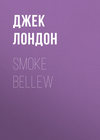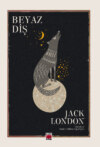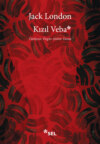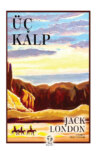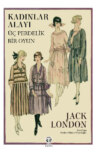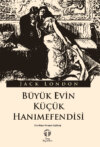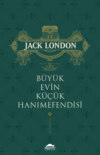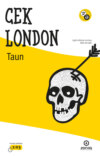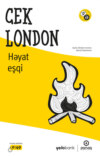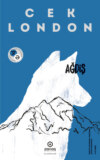Kitabı oku: «Smoke Bellew», sayfa 11
As fast as a team was selected, its owner, with half a dozen aids, departed to harness up and get ready.
One team was rejected because it had come in tired that afternoon. One owner contributed his team, but apologetically exposed a bandaged ankle that prevented him from driving it. This team Smoke took, overriding the objection of the crowd that he was played out.
Long Bill Haskell pointed out that while Fat Olsen’s team was a crackerjack, Fat Olsen himself was an elephant. Fat Olsen’s two hundred and forty pounds of heartiness was indignant. Tears of anger came into his eyes, and his Scandinavian explosions could not be stopped until he was given a place in the heavy division, the craps-player jumping at the chance to take out Olsen’s light team.
Five teams were accepted and were being harnessed and loaded, but only four drivers had satisfied the committee of the whole.
“There’s Cultus George,” some one cried. “He’s a trail-eater, and he’s fresh and rested.”
All eyes turned upon the Indian, but his face was expressionless, and he said nothing.
“You’ll take a team,” Smoke said to him.
Still the big Indian made no answer. As with an electric thrill, it ran through all of them that something untoward was impending. A restless shifting of the group took place, forming a circle in which Smoke and Cultus George faced each other. And Smoke realized that by common consent he had been made the representative of his fellows in what was taking place, in what was to take place. Also, he was angered. It was beyond him that any human creature, a witness to the scramble of volunteers, should hang back. For another thing, in what followed, Smoke did not have Cultus George’s point of view – did not dream that the Indian held back for any reason save the selfish, mercenary one.
“Of course you will take a team,” Smoke said.
“How much?” Cultus George asked.
A snarl, spontaneous and general, grated in the throats and twisted the mouths of the miners. At the same moment, with clenched fists or fingers crooked to grip, they pressed in on the offender.
“Wait a bit, boys,” Smoke cried. “Maybe he doesn’t understand. Let me explain it to him. Look here, George. Don’t you see, nobody is charging anything. They’re giving everything to save two hundred Indians from starving to death.” He paused, to let it sink home.
“How much?” said Cultus George.
“Wait, you fellows! Now listen, George. We don’t want you to make any mistake. These starving people are your kind of people. They’re another tribe, but they’re Indians just the same. Now you’ve seen what the white men are doing – coughing up their dust, giving their dogs and sleds, falling over one another to hit the trail. Only the best men can go with the first sleds. Look at Fat Olsen there. He was ready to fight because they wouldn’t let him go. You ought to be mighty proud because all men think you are a number-one musher. It isn’t a case of how much, but how quick.”
“How much?” said Cultus George.
“Kill him!” “Bust his head!” “Tar and feathers!” were several of the cries in the wild medley that went up, the spirit of philanthropy and good fellowship changed to brute savagery on the instant.
In the storm-center Cultus George stood imperturbable, while Smoke thrust back the fiercest and shouted:
“Wait! Who’s running this?” The clamor died away. “Fetch a rope,” he added quietly.
Cultus George shrugged his shoulders, his face twisting tensely in a sullen and incredulous grin. He knew this white-man breed. He had toiled on trail with it and eaten its flour and bacon and beans too long not to know it. It was a law-abiding breed. He knew that thoroughly. It always punished the man who broke the law. But he had broken no law. He knew its law. He had lived up to it. He had neither murdered, stolen, nor lied. There was nothing in the white man’s law against charging a price and driving a bargain. They all charged a price and drove bargains. He was doing nothing more than that, and it was the thing they had taught him. Besides, if he wasn’t good enough to drink with them, then he was not good enough to be charitable with them, nor to join them in any other of their foolish diversions.
Neither Smoke nor any man there glimpsed what lay in Cultus George’s brain, behind his attitude and prompting his attitude. Though they did not know it, they were as beclouded as he in the matter of mutual understanding. To them, he was a selfish brute; to him, they were selfish brutes.
When the rope was brought, Long Bill Haskell, Fat Olsen, and the craps-player, with much awkwardness and angry haste, got the slip-noose around the Indian’s neck and rove the rope over a rafter. At the other end of the dangling thing a dozen men tailed on, ready to hoist away.
Nor had Cultus George resisted. He knew it for what it was – bluff. The whites were strong on bluff. Was not draw-poker their favorite game? Did they not buy and sell and make all bargains with bluff? Yes; he had seen a white man do business with a look on his face of four aces and in his hand a busted straight.
“Wait,” Smoke commanded. “Tie his hands. We don’t want him climbing.”
More bluff, Cultus George decided, and passively permitted his hands to be tied behind his back.
“Now it’s your last chance, George,” said Smoke. “Will you take out the team?”
“How much?” said Cultus George.
Astounded at himself that he should be able to do such a thing, and at the same time angered by the colossal selfishness of the Indian, Smoke gave the signal. Nor was Cultus George any less astounded when he felt the noose tighten with a jerk and swing him off the floor. His stolidity broke on the instant. On his face, in quick succession, appeared surprise, dismay, and pain.
Smoke watched anxiously. Having never been hanged himself, he felt a tyro at the business. The body struggled convulsively, the tied hands strove to burst the bonds, and from the throat came unpleasant noises of strangulation. Suddenly Smoke held up his hand.
“Slack away” he ordered.
Grumbling at the shortness of the punishment, the men on the rope lowered Cultus George to the floor. His eyes were bulging, and he was tottery on his feet, swaying from side to side and still making a fight with his hands. Smoke divined what was the matter, thrust violent fingers between the rope and the neck, and brought the noose slack with a jerk. With a great heave of the chest, Cultus George got his first breath.
“Will you take that team out?” Smoke demanded.
Cultus George did not answer. He was too busy breathing.
“Oh, we white men are hogs,” Smoke filled in the interval, resentful himself at the part he was compelled to play. “We’d sell our souls for gold, and all that; but once in a while we forget about it and turn loose and do something without a thought of how much there is in it. And when we do that, Cultus George, watch out. What we want to know now is: Are you going to take out that team?”
Cultus George debated with himself. He was no coward. Perhaps this was the extent of their bluff, and if he gave in now he was a fool. And while he debated, Smoke suffered from secret worry lest this stubborn aborigine would persist in being hanged.
“How much?” said Cultus George.
Smoke started to raise his hand for the signal.
“Me go,” Cultus George said very quickly, before the rope could tighten.
“An’ when that rescue expedition found me,” Shorty told it in the Annie Mine, “that ornery Cultus George was the first in, beatin’ Smoke’s sled by three hours, an’ don’t you forget it, Smoke comes in second at that. Just the same, it was about time, when I heard Cultus George a-yellin’ at his dogs from the top of the divide, for those blamed Siwashes had ate my moccasins, my mitts, the leather lacin’s, my knife-sheath, an’ some of ‘em was beginnin’ to look mighty hungry at me – me bein’ better nourished, you see.
“An’ Smoke? He was near dead. He hustled around a while, helpin’ to start a meal for them two hundred sufferin’ Siwashes; an’ then he fell asleep, settin’ on his haunches, thinkin’ he was feedin’ snow into a thawin’-pail. I fixed him my bed, an’ dang me if I didn’t have to help him into it, he was that give out. Sure I win the toothpicks. Didn’t them dogs just naturally need the six salmon Smoke fed ‘em at the noonin’?”
IX. THE MISTAKE OF CREATION
“Whoa!” Smoke yelled at the dogs, throwing his weight back on the gee-pole to bring the sled to a halt.
“What’s eatin’ you now?” Shorty complained. “They ain’t no water under that footing.”
“No; but look at that trail cutting out to the right,” Smoke answered. “I thought nobody was wintering in this section.”
The dogs, on the moment they stopped, dropped in the snow and began biting out the particles of ice from between their toes. This ice had been water five minutes before. The animals had broken through a skein of ice, snow-powdered, which had hidden the spring water that oozed out of the bank and pooled on top of the three-foot winter crust of Nordbeska River.
“First I heard of anybody up the Nordbeska,” Shorty said, staring at the all but obliterated track covered by two feet of snow, that left the bed of the river at right angles and entered the mouth of a small stream flowing from the left. “Mebbe they’re hunters and pulled their freight long ago.”
Smoke, scooping the light snow away with mittened hands, paused to consider, scooped again, and again paused. “No,” he decided. “There’s been travel both ways, but the last travel was up that creek. Whoever they are, they’re there now – certain. There’s been no travel for weeks. Now what’s been keeping them there all the time? That’s what I want to know.”
“And what I want to know is where we’re going to camp to-night,” Shorty said, staring disconsolately at the sky-line in the southwest, where the mid-afternoon twilight was darkening into night.
“Let’s follow the track up the creek,” was Smoke’s suggestion. “There’s plenty of dead timber. We can camp any time.”
“Sure we can camp any time, but we got to travel most of the time if we ain’t goin’ to starve, an’ we got to travel in the right direction.”
“We’re going to find something up that creek,” Smoke went on.
“But look at the grub! Look at them dogs!” Shorty cried. “Look at – oh, hell, all right. You will have your will.”
“It won’t make the trip a day longer,” Smoke urged. “Possibly no more than a mile longer.”
“Men has died for as little as a mile,” Shorty retorted, shaking his head with lugubrious resignation. “Come on for trouble. Get up, you poor sore-foots, you – get up! Haw! You Bright! Haw!”
The lead-dog obeyed, and the whole team strained weakly into the soft snow.
“Whoa!” Shorty yelled. “It’s pack trail.”
Smoke pulled his snow-shoes from under the sled-lashings, bound them to his moccasined feet, and went to the fore to press and pack the light surface for the dogs.
It was heavy work. Dogs and men had been for days on short rations, and few and limited were the reserves of energy they could call upon. Though they followed the creek bed, so pronounced was its fall that they toiled on a stiff and unrelenting up-grade. The high rocky walls quickly drew near together, so that their way led up the bottom of a narrow gorge. The long lingering twilight, blocked by the high mountains, was no more than semi-darkness.
“It’s a trap,” Shorty said. “The whole look of it is rotten. It’s a hole in the ground. It’s the stampin’-ground of trouble.”
Smoke made no reply, and for half an hour they toiled on in silence – a silence that was again broken by Shorty.
“She’s a-workin’,” he grumbled. “She’s sure a-workin’, an’ I’ll tell you if you’re minded to hear an’ listen.”
“Go on,” Smoke answered.
“Well, she tells me, plain an’ simple, that we ain’t never goin’ to get out of this hole in the ground in days an’ days. We’re goin’ to find trouble an’ be stuck in here a long time an’ then some.”
“Does she say anything about grub?” Smoke queried unsympathetically. “For we haven’t grub for days and days and days and then some.”
“Nope. Nary whisper about grub. I guess we’ll manage to make out. But I tell you one thing, Smoke, straight an’ flat. I’ll eat any dog in the team exceptin’ Bright. I got to draw the line on Bright. I just couldn’t scoff him.”
“Cheer up,” Smoke girded. “My hunch is working overtime. She tells me there’ll be no dogs eaten, and, whether it’s moose or caribou or quail on toast, we’ll all fatten up.”
Shorty snorted his unutterable disgust, and silence obtained for another quarter of an hour.
“There’s the beginning of your trouble,” Smoke said, halting on his snow-shoes and staring at an object that lay on one side of the old trail.
Shorty left the gee-pole and joined him, and together they gazed down on the body of a man beside the trail.
“Well fed,” said Smoke.
“Look at them lips,” said Shorty.
“Stiff as a poker,” said Smoke, lifting an arm, that, without moving, moved the whole body.
“Pick ‘m up an’ drop ‘m and he’d break to pieces,” was Shorty’s comment.
The man lay on his side, solidly frozen. From the fact that no snow powdered him, it was patent that he had lain there but a short time.
“There was a general fall of snow three days back,” said Shorty.
Smoke nodded, bending over the corpse, twisting it half up to face them, and pointing to a bullet wound in the temple. He glanced to the side and tilted his head at a revolver that lay on top of the snow.
A hundred yards farther on they came upon a second body that lay face downward in the trail. “Two things are pretty clear,” Smoke said. “They’re fat. That means no famine. They’ve not struck it rich, else they wouldn’t have committed suicide.”
“If they did,” Shorty objected.
“They certainly did. There are no tracks besides their own, and each is powder-burned.” Smoke dragged the corpse to one side and with the toe of his moccasin nosed a revolver out of the snow into which it had been pressed by the body. “That’s what did the work. I told you we’d find something.”
“From the looks of it we ain’t started yet. Now what’d two fat geezers want to kill theirselves for?”
“When we find that out we’ll have found the rest of your trouble,” Smoke answered. “Come on. It’s blowing dark.”
Quite dark it was when Smoke’s snow-shoe tripped him over a body. He fell across a sled, on which lay another body. And when he had dug the snow out of his neck and struck a match, he and Shorty glimpsed a third body, wrapped in blankets, lying beside a partially dug grave. Also, ere the match flickered out, they caught sight of half a dozen additional graves.
“B-r-r-r,” Shorty shivered. “Suicide Camp. All fed up. I reckon they’re all dead.”
“No – peep at that.” Smoke was looking farther along at a dim glimmer of light. “And there’s another light – and a third one there. Come on. Let’s hike.”
No more corpses delayed them, and in several minutes, over a hard-packed trail, they were in the camp.
“It’s a city,” Shorty whispered. “There must be twenty cabins. An’ not a dog. Ain’t that funny!”
“And that explains it,” Smoke whispered back excitedly. “It’s the Laura Sibley outfit. Don’t you remember? Came up the Yukon last fall on the Port Townsend Number Six. Went right by Dawson without stopping. The steamer must have landed them at the mouth of the creek.”
“Sure. I remember. They was Mormons.”
“No – vegetarians.” Smoke grinned in the darkness. “They won’t eat meat and they won’t work dogs.”
“It’s all the same. I knowed they was something funny about ‘em. Had the allwise steer to the yellow. That Laura Sibley was goin’ to take ‘em right to the spot where they’d all be millionaires.”
“Yes; she was their seeress – had visions and that sort of stuff. I thought they went up the Nordensjold.”
“Huh! Listen to that!”
Shorty’s hand in the darkness went out warningly to Smoke’s chest, and together they listened to a groan, deep and long drawn, that came from one of the cabins. Ere it could die away it was taken up by another cabin, and another – a vast suspiration of human misery. The effect was monstrous and nightmarish.
“B-r-r-r,” Shorty shivered. “It’s gettin’ me goin’. Let’s break in an’ find what’s eatin’ ‘em.”
Smoke knocked at a lighted cabin, and was followed in by Shorty in answer to the “Come in” of the voice they heard groaning. It was a simple log cabin, the walls moss-chinked, the earth floor covered with sawdust and shavings. The light was a kerosene-lamp, and they could make out four bunks, three of which were occupied by men who ceased from groaning in order to stare.
“What’s the matter?” Smoke demanded of one whose blankets could not hide his broad shoulders and massively muscled body, whose eyes were pain-racked and whose cheeks were hollow. “Smallpox? What is it?”
In reply, the man pointed at his mouth, spreading black and swollen lips in the effort; and Smoke recoiled at the sight.
“Scurvy,” he muttered to Shorty; and the man confirmed the diagnosis with a nod of the head.
“Plenty of grub?” Shorty asked.
“Yep,” was the answer from a man in another bunk. “Help yourself. There’s slathers of it. The cabin next on the other side is empty. Cache is right alongside. Wade into it.”
In every cabin they visited that night they found a similar situation. Scurvy had smitten the whole camp. A dozen women were in the party, though the two men did not see all of them. Originally there had been ninety-three men and women. But ten had died, and two had recently disappeared. Smoke told of finding the two, and expressed surprise that none had gone that short distance down the trail to find out for themselves. What particularly struck him and Shorty was the helplessness of these people. Their cabins were littered and dirty. The dishes stood unwashed on the rough plank tables. There was no mutual aid. A cabin’s troubles were its own troubles, and already they had ceased from the exertion of burying their dead.
“It’s almost weird,” Smoke confided to Shorty. “I’ve met shirkers and loafers, but I never met so many all at one time. You heard what they said. They’ve never done a tap. I’ll bet they haven’t washed their own faces. No wonder they got scurvy.”
“But vegetarians hadn’t ought to get scurvy,” Shorty contended. “It’s the salt-meat-eaters that’s supposed to fall for it. And they don’t eat meat, salt or fresh, raw or cooked, or any other way.”
Smoke shook his head. “I know. And it’s vegetable diet that cures scurvy. No drugs will do it. Vegetables, especially potatoes, are the only dope. But don’t forget one thing, Shorty: we are not up against a theory but a condition. The fact is these grass-eaters have all got scurvy.”
“Must be contagious.”
“No; that the doctors do know. Scurvy is not a germ disease. It can’t be caught. It’s generated. As near as I can get it, it’s due to an impoverished condition of the blood. Its cause is not something they’ve got, but something they haven’t got. A man gets scurvy for lack of certain chemicals in his blood, and those chemicals don’t come out of powders and bottles, but do come out of vegetables.”
“An’ these people eats nothin’ but grass,” Shorty groaned. “And they’ve got it up to their ears. That proves you’re all wrong, Smoke. You’re spielin’ a theory, but this condition sure knocks the spots outa your theory. Scurvy’s catchin’, an’ that’s why they’ve all got it, an’ rotten bad at that. You an’ me’ll get it too, if we hang around this diggin’. B-r-r-r! – I can feel the bugs crawlin’ into my system right now.”
Smoke laughed skeptically, and knocked on a cabin door. “I suppose we’ll find the same old thing,” he said. “Come on. We’ve got to get a line on the situation.”
“What do you want?” came a woman’s sharp voice.
“We want to see you,” Smoke answered.
“Who are you?”
“Two doctors from Dawson,” Shorty blurted in, with a levity that brought a punch in the short ribs from Smoke’s elbow.
“Don’t want to see any doctors,” the woman said, in tones crisp and staccato with pain and irritation. “Go away. Good night. We don’t believe in doctors.”
Smoke pulled the latch, shoved the door open, and entered, turning up the low-flamed kerosene-lamp so that he could see. In four bunks four women ceased from groaning and sighing to stare at the intruders. Two were young, thin-faced creatures, the third was an elderly and very stout woman, and the fourth, the one whom Smoke identified by her voice, was the thinnest, frailest specimen of the human race he had ever seen. As he quickly learned, she was Laura Sibley, the seeress and professional clairvoyant who had organized the expedition in Los Angeles and led it to this death-camp on the Nordbeska. The conversation that ensued was acrimonious. Laura Sibley did not believe in doctors. Also, to add to her purgatory, she had wellnigh ceased to believe in herself.
“Why didn’t you send out for help?” Smoke asked, when she paused, breathless and exhausted, from her initial tirade. “There’s a camp at Stewart River, and eighteen days’ travel would fetch Dawson from here.”
“Why didn’t Amos Wentworth go?” she demanded, with a wrath that bordered on hysteria.
“Don’t know the gentleman,” Smoke countered. “What’s he been doing?”
“Nothing. Except that he’s the only one that hasn’t caught the scurvy. And why hasn’t he caught the scurvy? I’ll tell you. No, I won’t.” The thin lips compressed so tightly that through the emaciated transparency of them Smoke was almost convinced he could see the teeth and the roots of the teeth. “And what would have been the use? Don’t I know? I’m not a fool. Our caches are filled with every kind of fruit juice and preserved vegetables. We are better situated than any other camp in Alaska to fight scurvy. There is no prepared vegetable, fruit, and nut food we haven’t, and in plenty.”
“She’s got you there, Smoke,” Shorty exulted. “And it’s a condition, not a theory. You say vegetables cures. Here’s the vegetables, and where’s the cure?”
“There’s no explanation I can see,” Smoke acknowledged. “Yet there is no camp in Alaska like this. I’ve seen scurvy – a sprinkling of cases here and there; but I never saw a whole camp with it, nor did I ever see such terrible cases. Which is neither here nor there, Shorty. We’ve got to do what we can for these people, but first we’ve got to make camp and take care of the dogs. We’ll see you in the morning, er – Mrs. Sibley.”
“MISS Sibley,” she bridled. “And now, young man, if you come fooling around this cabin with any doctor stuff I’ll fill you full of birdshot.”
“This divine seeress is a sweet one,” Smoke chuckled, as he and Shorty felt their way back through the darkness to the empty cabin next to the one they had first entered.
It was evident that two men had lived until recently in the cabin, and the partners wondered if they weren’t the two suicides down the trail. Together they overhauled the cache and found it filled with an undreamed-of variety of canned, powdered, dried, evaporated, condensed, and desiccated foods.
“What in the name of reason do they want to go and get scurvy for?” Shorty demanded, brandishing to the light packages of egg-powder and Italian mushrooms. “And look at that! And that!” He tossed out cans of tomatoes and corn and bottles of stuffed olives. “And the divine steeress got the scurvy, too. What d’ye make of it?”
“Seeress,” Smoke corrected.
“Steeress,” Shorty reiterated. “Didn’t she steer ‘em here to this hole in the ground?”
Next morning, after daylight, Smoke encountered a man carrying a heavy sled-load of firewood. He was a little man, clean-looking and spry, who walked briskly despite the load. Smoke experienced an immediate dislike.
“What’s the matter with you?” he asked.
“Nothing,” the little man answered.
“I know that,” Smoke said. “That’s why I asked you. You’re Amos Wentworth. Now why under the sun haven’t you the scurvy like all the rest?”
“Because I’ve exercised,” came the quick reply. “There wasn’t any need for any of them to get it if they’d only got out and done something. What did they do? Growled and kicked and grouched at the cold, the long nights, the hardships, the aches and pains and everything else. They loafed in their beds until they swelled up and couldn’t leave them, that’s all. Look at me. I’ve worked. Come into my cabin.”
Smoke followed him in.
“Squint around. Clean as a whistle, eh? You bet. Everything shipshape. I wouldn’t keep those chips and shavings on the floor except for the warmth, but they’re clean chips and shavings. You ought to see the floor in some of the shacks. Pig-pens. As for me, I haven’t eaten a meal off an unwashed dish. No, sir. It meant work, and I’ve worked, and I haven’t the scurvy. You can put that in your pipe and smoke it.”
“You’ve hit the nail on the head,” Smoke admitted. “But I see you’ve only one bunk. Why so unsociable?”
“Because I like to be. It’s easier to clean up for one than two, that’s why. The lazy blanket-loafers! Do you think that I could have stood one around? No wonder they got scurvy.”
It was very convincing, but Smoke could not rid himself of his dislike of the man.
“What’s Laura Sibley got it in for you for?” he asked abruptly.
Amos Wentworth shot a quick look at him. “She’s a crank,” was the reply. “So are we all cranks, for that matter. But Heaven save me from the crank that won’t wash the dishes that he eats off of, and that’s what this crowd of cranks are like.”
A few minutes later, Smoke was talking with Laura Sibley. Supported by a stick in either hand, she had paused in hobbling by his cabin.
“What have you got it in for Wentworth for?” he asked, apropos of nothing in the conversation and with a suddenness that caught her off her guard.
Her green eyes flashed bitterly, her emaciated face for the second was convulsed with rage, and her sore lips writhed on the verge of unconsidered speech. But only a splutter of gasping, unintelligible sounds issued forth, and then, by a terrible effort, she controlled herself.
“Because he’s healthy,” she panted. “Because he hasn’t the scurvy. Because he is supremely selfish. Because he won’t lift a hand to help anybody else. Because he’d let us rot and die, as he is letting us rot and die, without lifting a finger to fetch us a pail of water or a load of firewood. That’s the kind of a brute he is. But let him beware! That’s all. Let him beware!”
Still panting and gasping, she hobbled on her way, and five minutes afterward, coming out of the cabin to feed the dogs, Smoke saw her entering Amos Wentworth’s cabin.
“Something rotten here, Shorty, something rotten,” he said, shaking his head ominously, as his partner came to the door to empty a pan of dish-water.
“Sure,” was the cheerful rejoinder. “An’ you an’ me’ll be catchin’ it yet. You’ll see.”
“I don’t mean the scurvy.”
“Oh, sure, if you mean the divine steeress. She’d rob a corpse. She’s the hungriest-lookin’ female I ever seen.”
“Exercise has kept you and me in condition, Shorty. It’s kept Wentworth in condition. You see what lack of exercise has done for the rest. Now it’s up to us to prescribe exercise for these hospital wrecks. It will be your job to see that they get it. I appoint you chief nurse.”
“What? Me?” Shorty shouted. “I resign.”
“No, you don’t. I’ll be able assistant, because it isn’t going to be any soft snap. We’ve got to make them hustle. First thing, they’ll have to bury their dead. The strongest for the burial squad; then the next strongest on the firewood squad (they’ve been lying in their blankets to save wood); and so on down the line. And spruce-tea. Mustn’t forget that. All the sour-doughs swear by it. These people have never even heard of it.”
“We sure got ourn cut out for us,” Shorty grinned. “First thing we know we’ll be full of lead.”
“And that’s our first job,” Smoke said. “Come on.”
In the next hour, each of the twenty-odd cabins was raided. All ammunition and every rifle, shotgun, and revolver was confiscated.
“Come on, you invalids,” was Shorty’s method. “Shootin’-irons – fork ‘em over. We need ‘em.”
“Who says so?” was the query at the first cabin.
“Two doctors from Dawson,” was Shorty’s answer. “An’ what they say goes. Come on. Shell out the ammunition, too.”
“What do you want them for?”
“To stand off a war-party of canned beef comin’ down the canyon. And I’m givin’ you fair warnin’ of a spruce-tea invasion. Come across.”
And this was only the beginning of the day. Men were persuaded, coaxed, bullied or dragged by main strength from their bunks and forced to dress. Smoke selected the mildest cases for the burial squad. Another squad was told off to supply the wood by which the graves were burned down into the frozen muck and gravel. Still another squad had to chop firewood and impartially supply every cabin. Those who were too weak for outdoor work were put to cleaning and scrubbing the cabins and washing clothes. One squad brought in many loads of spruce-boughs, and every stove was used for the brewing of spruce-tea.
But no matter what face Smoke and Shorty put on it, the situation was grim and serious. At least thirty fearful and impossible cases could not be taken from the beds, as the two men, with nausea and horror, learned; while one, a woman, died in Laura Sibley’s cabin. Yet strong measures were necessary.
“I don’t like to wallop a sick man,” Shorty explained, his fist doubled menacingly. “But I’d wallop his block off if it’d make him well. And what all you lazy bums needs is a wallopin’. Come on! Out of that an’ into them duds of yourn, double quick, or I’ll sure muss up the front of your face.”
All the gangs groaned, and sighed, and wept, the tears streaming and freezing down their cheeks as they toiled; and it was patent that their agony was real. The situation was desperate, and Smoke’s prescription was heroic.
When the work-gangs came in at noon, they found decently cooked dinners awaiting them, prepared by the weaker members of their cabins under the tutelage and drive of Smoke and Shorty.
“That’ll do,” Smoke said at three in the afternoon. “Knock off. Go to your bunks. You may be feeling rotten now, but you’ll be the better for it to-morrow. Of course it hurts to get well, but I’m going to get you well.”
“Too late,” Amos Wentworth sneered pallidly at Smoke’s efforts. “They ought to have started in that way last fall.”
